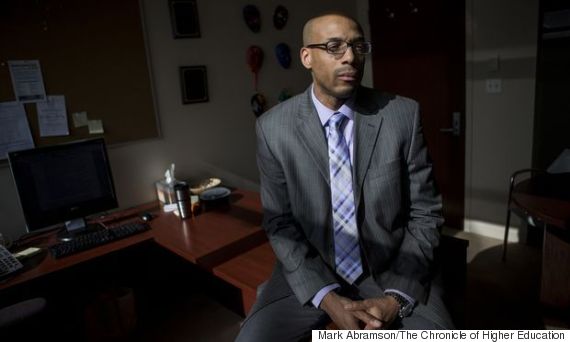
Ronald Day, who spent 15 years in state prison, was recently appointed Associate Vice President of the Fortune Society. (Mark Abramson/The Chronicle of Higher Education)
By Robert Lewis: Reporter, WNYC News
After years in and out of jail, Thomas Onaje Benjamin turned his life around, earning multiple degrees and getting a good job running the re-entry program at the Dutchess County jail. There he preaches the transformative power of education. But Benjamin said there are hurdles for people like him -- right there on most college applications.
"I just graduated from Fordham. I spent three years and $65,000 to get a masters degree and it's my second masters degree and there was a box on Fordham's application," Benjamin said.
That box is the one asking if he'd ever been convicted of a crime. More than half the colleges in the country ask that question on their application, according to a recent study by the Center for Community Alternatives, a nonprofit that looked at admissions policies across the country for people with criminal records.
Benjamin is part of a growing chorus of advocates who want to ban the box for college admissions. It's similar to a movement that took hold in employment.
They say the criminal history question can discourage would-be applicants who feel stigmatized, and is often the precursor to an application process full of extra hurdles for people with records. They argue that the question discriminates against people who have already paid their debt to society - many of them black or Latino young men who have been caught up in the wave of mass incarceration over the last three decades.
Out of 35,000 parolees in New York state, only about 500 -- less than two percent -- are enrolled in an education program including college, according to state data.
But the "Ban the Box" campaign must overcome public concern over campus safety.
The State University of New York started asking applicants in 1998 if they have ever been convicted of a felony. Those that check the box are required to provide additional information such as a rap sheet and letters of support, and some have to go before a special review committee to discuss their crimes. Legally, campuses aren't supposed to reject applicants solely on the basis of a conviction but can turn down people for safety concerns.
"This process is a way to balance the educational access of ex-offenders with campus safety or the perception of campus safety. So it's a balancing act," said Paul Berger, deputy commissioner for the SUNY police. "There's a sorting process, the same with any college admission. You have to have the grades to get in. You have to have the financial wherewithal to pay for it. It's a competitive process that way. But I wouldn't say it's discriminatory."
The Center for Community Alternatives is releasing a study looking at admissions data from 30 of SUNY's 60 campuses.
Of the campuses that provided data, the median rejection rate for applicants who disclosed a felony conviction and made it all the way through the application process was about 4 percent. But the study shows people with criminal records are three times more likely than other applicants to drop out of the process before ever completing their application.
"At some point you begin to see the box as something to exclude you," said Alan Rosenthal, the Center's counsel and adviser on special projects. "When you see a box in the college context...some people are simply chilled away from the application."
Out of 1,500 applicants who check the box each year at those 30 campuses, about 900 never complete their application, according to the study. There are, of course, numerous reasons why an applicant might not finish the process. and the study doesn't consider other factors that might lead to attrition.
University police officials acknowledge they don't have -- and aren't aware of -- any data showing ex-convicts are more likely to commit a crime on campus than someone without a record.
But Bruce McBride, SUNY police commissioner, said the screening process is still important.
"It's risk management. I mean that's what we're dealing with, risk management. We're saying does this person have a possibility. Is this campus correct for this person based on their criminal record?" McBride said.
In contrast to SUNY, the City University of New York doesn't ask about criminal history on its application. But other schools are even more cautious than SUNY. The Common Application, a standardized form for close to 550 colleges, added a question in 2007 asking about all convictions - including misdemeanors. The question was added a few years after two campus killings at the University of North Carolina. Media reports from the time show both were committed by students with criminal records.
But advocates say such incidents are an exception and most people who have run-ins with the criminal justice system don't go to college to commit crime. Elected officials are starting to pay attention to that argument.
In the fall, state Attorney General Eric Schneiderman's Office got three colleges to stop asking applicants if they'd ever been arrested -- not just convicted. Earlier this year, lawmakers introduced a bill in Albany to keep state colleges from asking about criminal history until after an applicant is accepted. A similar bill last year never made it out of committee.
This story was reported in partnership with The Marshall Project, a nonprofit news organization focused on the U.S. criminal justice system.